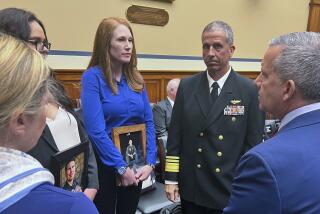Air Force Board to Evaluate Northrop’s MX Guidance System
- Share via
The Air Force is forming a scientific advisory board to evaluate reported problems in MX missile guidance equipment supplied by Northrop, indicating that doubts may still exist about the integrity of the system, it was learned Thursday.
The formation of the board, which will be announced today, comes after top Air Force officials unequivocally disputed in congressional testimony the allegations made by three Northrop engineers that the MX guidance system is unreliable and inaccurate.
“The questions about reliability and accuracy are out there,” said a staff member on the House Armed Services Committee, which has held four hearings on Northrop’s problems. “The committee is not going to give these guys any more money until the situation improves.”
Meanwhile, another congressional committee is also accumulating evidence on Northrop’s “inertial measurement units” (IMUs), as the guidance equipment is known, with the possible result that another set of hearings may extend the scrutiny of Northrop.
The House Energy and Commerce Committee’s subcommittee on oversight and investigations has accumulated evidence that “raises serious questions” about the accuracy and reliability of the IMU, a subcommittee staff member said Thursday.
In testimony before the Armed Services Committee, Air Force Gen. Lawrence A. Skantze said June 30 that the MX had been 33% more accurate than required in 17 test shots and that the Northrop IMU is twice as reliable in terms of frequency of failure as had been predicted.
However, “the failure rate appears to be many times higher than what the Air Force testified to,” the staff member said, noting that the subcommittee chairman, Rep. John D. Dingell (D-Mich.), is preparing to call hearings on the matter.
The subcommittee’s evidence, he said, is based on internal Northrop and Air Force documents that show repeated failures of the guidance system while on alert status at F. E. Warren Air Force Base, Wyo., where the MX is based.
The Air Force has acknowledged that one-third of the MX missiles at Warren are not ready to be launched because Northrop has not delivered a sufficient number of IMUs.
Northrop had delivered 45 of the units to the Air Force through the end of June, 18 short of the number its production contracts required, according to figures supplied Thursday by the Air Force Ballistic Missile Office at Norton Air Force Base in San Bernardino.
The missile office also disclosed that the amount of MX contract payments to Northrop that have been held up because of the company’s late deliveries has been increased to about $90 million. The cost to finance $90 million would be about $7.4 million a year and is not an allowable charge to Pentagon contracts.
The reason for forming the scientific advisory board and whether it was formed under pressure from the Armed Services Committee was not immediately known.
One Air Force official suggested that the board was being formed not to settle any doubts the Air Force might have about the IMU but “to put the entire issue to rest.”
Members of the board have not yet been named, but they are expected to include representatives of the aerospace industry and the aerospace technical community, sources said.
Historically, the Air Force has not convened such boards just because of outside allegations of deficiencies in one of its weapons. It did not do so, for example, in the B-1 bomber controversy.
The MX issue is a more troubling issue because of its critical importance to the U.S. nuclear forces intended to deter war. Serious doubts about the integrity of the missile would presumably negate its deterrent value.
A staff member of Dingell’s subcommittee, however, reacted negatively to news of the formation of the advisory board. He called it a “delaying tactic” that was undertaken because the Air Force realizes that many of the statements it has made about the reliability and accuracy of the missile may not be true.
An Air Force spokesman said he could not respond to the report that the Dingell subcommittee has new evidence concerning the reliability and accuracy of the missile because he had not seen the evidence.
Northrop Vice President David Ferguson said in an Armed Services Committee hearing last month that allegations about flaws in the IMU were “unadulterated nonsense.”
Nonetheless, Ferguson last week removed Northrop executives in charge of the guidance system. In addition to the technical issues, Northrop is under a number of investigations for its management practices.
More to Read
Inside the business of entertainment
The Wide Shot brings you news, analysis and insights on everything from streaming wars to production — and what it all means for the future.
You may occasionally receive promotional content from the Los Angeles Times.











